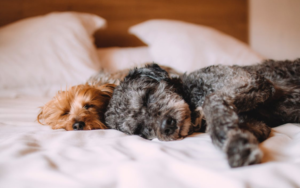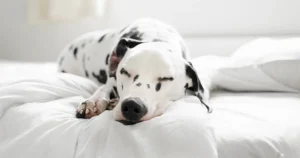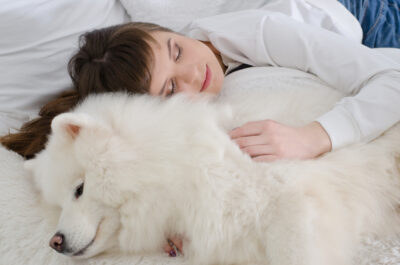In this article, we’ll go into detail about whether can dogs have sleep Apnea. We’ll also talk about ways to prevent your dog from developing this condition and tips on monitoring your dog’s breathing during the night.
Dogs, like many animals, can have sleep apnea. This is a disorder in which the tongue falls back and blocks the airway while sleeping. While it’s not common in dogs, it can be dangerous if left untreated.
Dogs can have sleep apnea, which is a condition that causes a person or animal to stop breathing for short periods during sleep. Various factors, including obesity, airway abnormalities, and underlying health conditions, can cause sleep apnea.
In dogs, sleep apnea may be more common in certain breeds, such as Bulldogs and Pugs, due to their facial structure and tendency towards obesity.
If you suspect your dog may have sleep apnea, it is essential to consult a veterinarian. They can assess your dog’s health and recommend a treatment plan, including weight loss, medication, or surgery. It is important to address sleep apnea in dogs as it can lead to serious health complications if left untreated.
Can Dogs Have Sleep Apnea?

Dogs can have sleep apnea, a disorder that causes interruptions in breathing during sleep. Sleep apnea can occur in dogs of any breed or size, but it is more common in overweight or obese dogs and dogs with certain respiratory or cardiac conditions.
Symptoms of sleep apnea in dogs may include loud snoring, pauses in breathing, gasping or choking during sleep, restless sleep, and excessive daytime sleepiness. If left untreated, sleep apnea can lead to serious health problems, including heart and lung damage, high blood pressure, and decreased oxygen levels in the blood.
If you suspect your dog may have sleep apnea, it is essential to consult a veterinarian for proper diagnosis and treatment. They can recommend a treatment plan that may include weight loss, medication, or other therapies.
What are signs of sleep apnea in dogs?
Sleep apnea is a condition that affects breathing during sleep and can occur in both humans and dogs. Some common signs of sleep apnea in dogs include:
1. Loud snoring: Dogs with sleep apnea may snore loudly, especially when they are in a deep sleep.
2. Pauses in breathing: Dogs with sleep apnea may experience pauses in breathing, or apnea, during sleep. These pauses can last for a few seconds to a few minutes and can be accompanied by gasping or choking sounds.
3. Restlessness during sleep: Dogs with sleep apnea may seem restless or agitated during sleep, tossing and turning or moving around.
4. Excessive daytime sleepiness: Dogs with sleep apnea may be excessively sleepy during the day and have difficulty staying awake.
5. Changes in behavior: Dogs with sleep apnea may exhibit changes in behavior, such as becoming more irritable or lethargic or experiencing a decline in cognitive function.
If you suspect your dog may suffer from sleep apnea, it is essential to consult your veterinarian for a proper diagnosis and treatment.
How do you treat a dog with sleep apnea?
Sleep apnea in dogs is a severe condition that can cause breathing problems during sleep. A physical obstruction in the airway, such as excess tissue in the throat or a deformity in the nasal passages, usually causes it.
Treatment for sleep apnea in dogs typically involves addressing the underlying cause of the obstruction. This may include surgery to remove excess tissue, repair a deformity, or use medications or other therapies to manage the condition.
If your dog has sleep apnea, it is essential to work closely with your veterinarian to determine the best course of treatment. Your veterinarian may recommend a combination of medical and lifestyle interventions to manage your dog’s condition and improve its quality of life. Some possible treatment options for sleep apnea in dogs include:
1. Surgery
Depending on the cause of the obstruction, your veterinarian may recommend surgery to remove excess tissue or repair a deformity in the airway.
2. Medications
Your veterinarian may prescribe medications to help manage your dog’s sleep apnea, such as bronchodilators to help open the airways or anti-inflammatory drugs to reduce swelling in the airway.
3. Weight management
If your dog is overweight or obese, helping it lose weight can help improve its breathing and reduce the severity of sleep apnea. Your veterinarian can recommend a weight loss plan that is safe and appropriate for your dog.
4. Lifestyle changes
Changing your dog’s environment and routine can help manage sleep apnea. For example, keeping your dog’s bed in a well-ventilated area, avoiding smoke and other irritants, and keeping your dog calm and relaxed before bedtime can all help improve its breathing during sleep.

Why does my dog sound like he can’t breathe when sleeping?
There are several possible reasons why your dog may sound like they are having difficulty breathing while they are sleeping, including:
Sleep apnea
Sleep apnea is a disorder that causes interruptions in breathing during sleep. Symptoms of sleep apnea in dogs may include loud snoring, pauses in breathing, gasping or choking during sleep, restless sleep, and excessive daytime sleepiness. If left untreated, sleep apnea can lead to serious health problems, including heart and lung damage, high blood pressure, and decreased oxygen levels in the blood.
Allergies
Allergies can cause inflammation in the airways and make breathing difficult for your dog. Various factors, including environmental allergens, food, and medications, can cause allergies.
Respiratory infections
Respiratory infections, such as pneumonia or bronchitis, can cause inflammation and mucus buildup in the airways, making breathing difficult for your dog.
Heart problems
Heart problems, such as congestive heart failure or valvular disease, can cause fluid accumulation in the lungs, making it difficult for your dog to breathe.
Suppose your dog has difficulty breathing while sleeping or at any other time. It is essential to consult a veterinarian for proper diagnosis and treatment. They can recommend a treatment plan that may include medication, dietary changes, or other therapies.
Is dog sleep apnea mask safe?
Dog sleep apnea masks, also known as continuous positive airway pressure (CPAP) masks, are designed to help dogs with sleep apnea breathe more easily during sleep. These masks are generally considered safe when used under the guidance of a veterinarian or other qualified healthcare professional.
However, as with any medical treatment, there are potential risks and side effects that should consider. Some dogs may be uncomfortable or resistant to wearing a mask, and it may take time to adjust to the treatment. In rare cases, the mask may cause irritation or skin irritation.
It’s essential to monitor your dog’s response to the mask closely and to consult with your veterinarian if you have any concerns. Dog sleep apnea masks can be an effective treatment for dogs with sleep apnea, but it’s essential to work closely with your veterinarian to determine the best treatment for your dog.
Do they make sleep apnea masks for dogs?

There are sleep apnea masks specifically designed for dogs. These masks, also known as continuous positive airway pressure (CPAP) masks, help dogs with sleep apnea breathe more easily during sleep.
Sleep apnea is a common condition in dogs, particularly breeds such as bulldogs, pugs, and other short-nosed breeds.
Dog sleep apnea masks deliver a continuous flow of air to the dog’s airways, which helps keep them open and prevent collapses or blockages during sleep. The masks are typically worn over the nose. connected to a machine that generates and delivers the airflow.
If your dog has been diagnosed with sleep apnea, your veterinarian may recommend using a sleep apnea mask as part of the treatment plan. It’s essential to work closely with your veterinarian to determine the most appropriate treatment plan for your dog, as well as to monitor their response to the treatment and make any necessary adjustments.
Can dogs live with sleep apnea?
Dogs can live with sleep apnea, although the condition can significantly impact their quality of life. Sleep apnea is a common disorder in dogs, particularly breeds such as bulldogs, pugs, and other short-nosed breeds.
It is characterized by repeated breathing interruptions during sleep, which can lead to snoring, choking, and other sleep disturbances.
If left untreated, sleep apnea can lead to various health problems in dogs, including an increased risk of heart problems, obesity, and other respiratory issues. Working closely with a veterinarian to develop a treatment plan for dogs with sleep apnea is essential.
Treatment options for sleep apnea in dogs may include lifestyle modifications, such as weight loss and exercise, as well as medical interventions, such as continuous positive airway pressure (CPAP) therapy or surgery.
With proper treatment, dogs with sleep apnea can lead happy, healthy lives. It’s essential to monitor your dog’s response to treatment and make any necessary adjustments to ensure its condition is well-controlled.
What is the only breed of dog that suffers from sleep apnea?
Sleep apnea is a common disorder in dogs and can affect any breed. However, certain breeds may be more prone to the condition due to their physical characteristics. Short-nosed breeds, such as bulldogs, pugs, and boxers, are particularly susceptible to sleep apnea because of how their airways are shaped.
These breeds tend to have narrow nostrils, small windpipes, and elongated soft palates, which can lead to airway obstructions during sleep.
Other breeds that may be more prone to sleep apnea include French bulldogs, Shih Tzus, and bichon frises. However, it’s important to note that any dog can develop sleep apnea, and it’s not limited to just these breeds.
If you’re concerned that your dog may have sleep apnea, it’s essential to consult with a veterinarian. They can thoroughly evaluate and determine your dog’s most appropriate treatment plan.
Why does my dog stop breathing in his sleep?

There are several reasons why a dog may stop breathing in its sleep. One of the most common causes is sleep apnea, a disorder characterized by repeated breathing interruptions during sleep.
Various factors, including obesity, upper airway abnormalities, and other underlying health conditions, can cause sleep apnea.
Other possible causes of breathing problems during sleep in dogs include respiratory infections, allergies, and chronic bronchitis. In some cases, the reason may be unknown.
If you notice that your dog is having difficulty breathing during sleep, it’s essential to consult with a veterinarian as soon as possible. They can perform a thorough evaluation and determine the underlying cause of the breathing problems. In some cases, treatment may be necessary to help your dog breathe more easily during sleep.
Can a dog die from sleep apnea?
A dog can die from sleep apnea. Sleep apnea is a condition in which an individual experiences pauses in breathing or shallow breaths while they are sleeping.
This can lead to a lack of oxygen in the body, which can be dangerous and even fatal if it occurs for an extended period. If a dog is experiencing sleep apnea, it is crucial to seek veterinary care as soon as possible to determine the cause and receive treatment.
How much dog sleep apnea surgery cost?
The cost of surgery for sleep apnea in dogs will vary depending on the specific procedure being performed and the case’s complexity. The cost of these procedures can range from $1000 to $3000, depending on the particular case.
Some standard surgical procedures for sleep apnea in dogs include:
Uvulopalatopharyngoplasty (UPPP): This procedure involves removing the excess tissue from the throat to improve airway flow.
Soft palate resection: This procedure involves removing a portion of the soft palate to improve airway flow.
Tracheostomy: This procedure involves opening the windpipe to improve airway flow.
It’s important to discuss the cost of surgery with your veterinarian and consider factors such as the severity of your dog’s condition, the expected benefits of the procedure, and your budget when deciding on treatment.
It’s also important to note that surgery is not always the best treatment option for sleep apnea in dogs, and other treatment options may be more appropriate for your dog. It’s essential to work closely with your veterinarian to determine your dog’s most appropriate treatment plan.

What is the success rate of sleep apnea surgery?
The success rate of sleep apnea surgery varies depending on the specific procedure performed and the individual patient. Some studies have reported success rates of 50-80% for uvulopalatopharyngoplasty (UPPP), a surgical procedure that removes excess tissue from the throat to increase the size of the airway.
However, other studies have reported lower success rates, and some patients may experience complications or need additional treatment after surgery.
It is important to note that surgical treatment for sleep apnea is typically only recommended for patients who have tried other treatment options, such as continuous positive airway pressure (CPAP) therapy, and have not had success with those treatments. Surgery should be considered a last resort after other treatment options have been exhausted.
Working closely with a healthcare professional to determine the most appropriate treatment plan for your specific needs is also essential. This may involve a combination of lifestyle changes, such as weight loss and quitting smoking, as well as medical treatments, such as CPAP therapy or medication.
Can sleep apnea go away with surgery?
You can treat sleep apnea in dogs with surgery. Sleep apnea in dogs is typically caused by upper airway obstruction, which various factors such as anatomic abnormalities, inflammation, or tumors can cause.
Surgical treatment for sleep apnea in dogs may involve removing or repairing obstructive tissue or repositioning the airway to improve airflow.
As with any surgical procedure, there are potential risks and complications associated with surgery for sleep apnea in dogs. After consulting with a veterinarian, you should decide to undergo surgery carefully.
In addition, it’s important to note that surgery may not be a suitable treatment option for all dogs with sleep apnea. It may also recommend other treatment options such as weight loss, medication, and lifestyle changes.
What are 3 causes of sleep apnea?

There are several causes of sleep apnea, including:
Obstructive sleep apnea
This is the most common type of sleep apnea and occurs when the muscles in the back of the throat fail to keep the airway open during sleep. Various factors, such as obesity, a large neck circumference, and structural abnormalities in the nose, mouth, or throat, can cause it.
Central sleep apnea
This type of sleep apnea occurs when the brain fails to send the proper signals to the muscles that control breathing. Various factors, including heart failure, stroke, and other neurological conditions, can cause it.
Complex sleep apnea syndrome (also known as treatment-emergent central sleep apnea)
This type of sleep apnea is a combination of obstructive sleep apnea and central sleep apnea. Various factors, including certain medications and alcohol consumption, can cause it.
It’s important to note that sleep apnea can have multiple causes and that each person’s experience with the condition may be unique. If you are experiencing sleep apnea symptoms, you must consult a healthcare professional for a proper diagnosis and treatment plan.
Conclusion
The summary of pet owners’ concerns on whether “Can Dogs Have Sleep Apnea ” is a condition in which the animal’s airway becomes partially or completely blocked during sleep, leading to disrupted breathing and possibly resulting in other health problems.
Several potential causes of sleep apnea in dogs include obesity, structural abnormalities in the nose, mouth, or throat, and certain medications or health conditions. For example, dogs with obesity or excess weight may have an increased risk of sleep apnea due to the additional fat tissue that can obstruct the airway.
Similarly, dogs with abnormalities in their nose, mouth, or throat structure may be more prone to sleep apnea due to the reduced ability to keep the airway open.
Finally, certain medications or health conditions, such as heart disease, can also increase dogs’ sleep apnea risk. If you suspect your dog may have sleep apnea, it is essential to consult a veterinarian for a proper diagnosis and treatment plan.


